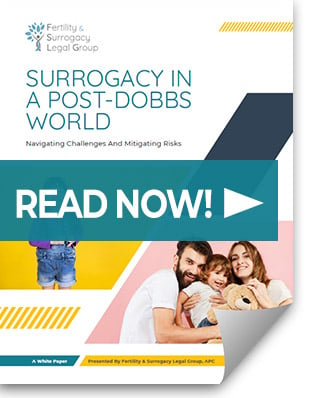To A Would-Be Egg Donor: Give Your Gift With Clarity And Confidence
Many couples interested in taking a surrogacy journey need an egg to create the embryos. The process of donating eggs or embryos can be complex. There are many nuanced legal considerations to take into account.
If you are considering donating an egg to help another family, you are doing the right thing by seeking legal advice. It is vitally important for all parties to understand their rights and responsibilities before taking the important step of the donation or acceptance of an egg.
We Can Be Your Partners On The Egg Donation Journey
Give the gift of your precious genetic material with confidence, knowing that Fertility & Surrogacy Legal Group, APC, is behind you. With ample experience representing both intended parents and egg donors in egg donation agreements, our team is well-positioned to guide you through the process, including negotiating favorable terms and protections.
We represent both domestic and international egg donors as well as recipients. Based in San Diego, our lawyers are licensed in multiple states, and we handle surrogacy work in every state where it’s legal.
How We Can Help You, The Egg Donor
First, we want to reassure you that we do what we do with the goal of improving people’s lives. Our firm focuses solely on fertility, assisted reproduction and surrogacy issues. Our team’s knowledge is deep, and our skills are always up to date.
Understanding the necessary legal steps is a critical part of a successful egg donation experience. Our services for egg donors, potential egg donors and intended parents planning to accept donated eggs include the following:
- Negotiating and advocating on your behalf with the attorney representing the intended parent(s), including such complicated terms as future contact, compensation, medical screening and care, and travel
- Drafting or providing legal review of egg donation agreements (for both direct and anonymous donors)
- Working with your fertility agency every step of the way, keeping them up to date on the legal process to ensure that your ovulation cycle is on time
- Drafting and sending legal clearance letters to appropriate fertility agencies and physicians
This journey can be both challenging and rewarding for all concerned. Recognizing your important role includes ensuring that you are fully aware of risks, benefits and terms of your arrangement.
How Do You Become An Egg Donor?
Most egg donors go through an agency such as a fertility clinic. Direct egg donation – that is, providing eggs to a relative or friend – is also a possibility. In both cases, you will need to meet certain criteria such as:
- Age: Generally, you must be between the ages of 21 and 30, although some agencies accept older donors.
- Health: You must be in good health, physically and mentally. You must be a nonsmoker and be within a certain range for body mass index (BMI).
- Reproductive condition: You must have both ovaries and healthy hormone levels with regular menstrual cycles.
Each agency has slightly different requirements, so it’s important to research the qualifications of agencies you’re considering working with. You should also carefully consider whether you want to remain fully anonymous or have a more open or semi-open arrangement.
Will Travel Be Required For Egg Donation?
It depends on where you live. In some states – such as California – fertility clinics are widespread, so travel may not be required. However, if you live in a more rural area or a state where assisted reproductive technology is less prevalent, you may need to travel. You should be prepared to commit to multiple appointments for initial screening, monitoring and several cycles of procedures.
What Are The Risks Of Egg Donation?
As with any medical procedure, egg donation comes with risks, such as:
- Weight gain
- Bleeding
- Infections
- Pelvic organ damage
- Unwanted pregnancy
- Ovarian hyperstimulation syndrome
- Side effects from hormonal treatment
There may be other long-term risks that aren’t fully known. Additionally, there are psychological risks such as stress and emotional attachment to the eggs.
It’s important to keep in mind that for many donors, the benefits far outweigh the risks. Most donors have a positive and enriching experience that is deeply meaningful to them.
Working with a skilled attorney to review your egg donation agreement can go a long way toward mitigating these risks. Our lawyers can make sure that you have adequate protections built into your agreement.
Take The Next Step And Contact Us
Every successful attorney-client relationship must begin with open and honest dialogue. We are passionate about helping make the legal processes work for you and the intended parents. Feel free to reach out to us at any time regarding your egg donation plans. Call 619-329-4411 or send an email inquiry through this website.

